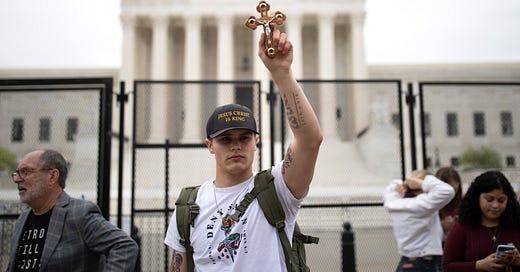On Thursday, New York Senator Kirsten Gillibrand gave a fiery speech on the impending end of Roe v. Wade. She emphasized the dishonesty of the justices who, based on a leaked draft, are ready to extinguish the constitutional right to abortion:
It is an outrage that we have five justices on the Supreme Court who lied, lied in their confirmation hearings in order to be confirmed. It is an outrage that in America today, that our judicial system is so corrupted and so politicized and no longer representative of the will of the people.Five justices said they respect precedent, five said that Roe v. Wade was established precedent, five said they would never undermine established precedent. It is unconscionable what this decision will do to the American people.
Gillibrand is right to emphasize the element of deception. Time and again, judicial nominees who had every intent to spike Roe insisted it was settled law. But the deception is not over. There’s a new prevarication afoot: the claim that ending Roe is a one-off, that other human rights are safe.
The Wall Street Journal editorialized along this line, lamenting the “ parade of horribles that Democrat and the media are trying to sell Americans”— a “parade of horribles” about future decisions squashing other rights.
The editorial is adamant that concerns about other major decisions being overturned are essentially hysteric, and insists that the justices, although critical of many these other decisions, would preserve them. Once again, the promise is that settled law will be protected.
Writing for CNN, the historian Nicole Hemmer debunks this line of argument:
Though Alito assures readers that overturning Roe will not threaten other basic rights (just as Justices Brett Kavanaugh and Neil Gorsuch assured Americans they considered Roe to be settled law), there is no reason to believe that is the case. The legal justifications underpinning the right to an abortion are foundational to other key decisions as well: Griswold v. Connecticut, which ruled states could not outlaw contraception; Loving v. Virginia, which ruled states could not outlaw interracial marriage; Lawrence v. Texas, which ruled that states could not outlaw sodomy; and Obergefell v. Hodges, which ruled states could not outlaw same-sex marriage. If you're comforting yourself with the fantasy they wouldn't go that far, think again: Republicans are already eyeing Obergefell.
To understand why rescinding Roe will not be a stand alone affair, it’s important to understand the nature of the opposition to Roe. It’s never been strictly about the law; the Christian right mobilized against Roe not because they care about the law, but because they are extremely opposed to women’s liberation and the social revolution that spearheaded enshrining women’s reproductive rights into law. Opposition to abortion, as sociologist Kristin Luker demonstrated in her classic 1984 book Abortion and the Politics of Motherhood, is rarely an isolated sentiment but exists withina network of traditionalist sentiment about gender roles.
In pursuit of the goal of extinguishing Roe, the Christian right led a fifty-year campaign that upturned American politics, and changed the shape of both major parties. They became the driving force of the Republican Party, pushing it to prioritize the courts above all else. When Republican-nominated justices disappointed them, the Christian right founded a privately held ideological organization (The Federalist Society) to vet nominees for political purity. The amazing discipline of the Christian right can be seen in the whole sequence of events starting with Supreme Court Justice Antonin Scalia’s death: making sure the GOP stonewalled the Merrick Garland nomination, rallying behind Trump, securing the retirement of Anthony Kennedy, and pushing ahead with securely right-wing nominees like Neil Gorsuch, Brett Kavanaugh, and Amy Coney Barrett.
Is it possible to imagine that so resolute and determined a movement will just fold up and retire once Roe has been vanquished? Isn’t it more likely that, energized by victory, the Christian right will push ahead with the rest of their agenda. After all, getting rid of Roe won’t end abortion—it will only allow very conservative states to ban abortions. But there will still be ways for women to get birth control that the Christian right (falsely) sees as abortifacients. There will be a push to secure state borders to make sure birth control doesn’t get in, and that women seekingabortions will face hurdles getting out.
Already, leading anti-choice figures like Harvard law professor Adrian Vermeule, are talking about the need for a federal ban.


One possibility is that the courts could (as justice Sam Alito hints at in his draft decision) recognize fetal personhood. If that happens, then there will be a national abortion ban.
Since the impulses behind the Christian right were never just about the legal objections to Roe but rather a wider opposition to social and sexual liberalism, it’s likely that the movement will continue to push for a return to anti-sodomy laws (even if that requires overturning Lawrence), a reversal of the right to birth control, and an overturning of marriage equality.
All of these are “settled law.” But the court is proving that settled law means nothing.
(Edited by Emily M. Keeler)
Share and Subscribe:
If you enjoyed this post, please share:





""The legal justifications underpinning the right to an abortion are foundational to other key decisions as well: Griswold v. Connecticut, which ruled states could not outlaw contraception; Loving v. Virginia, which ruled states could not outlaw interracial marriage; Lawrence v. Texas, which ruled that states could not outlaw sodomy; and Obergefell v. Hodges, which ruled states could not outlaw same-sex marriage. ""
Loving v. Virginia's holding is primarily based on equal protection not due process. This is an important distinction, as the substantive "right to privacy" the other cases rely upon is not required to uphold Loving. I am not surprised a historian by trade would miss this point.
unsettling developments :(